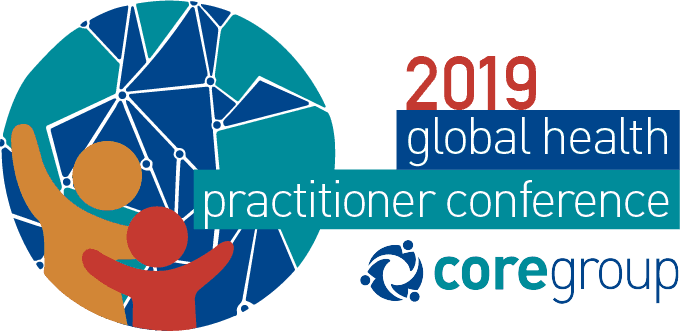
Conference Overview
The 2019 Global Health Practitioner Conference on May 6-9 in Bethesda, Maryland, USA welcomed 332 implementers, academics, donors, private sector, and other community health advocates from over 14 countries representing over 107 organizations to explore the dynamic and ever-evolving profile of partnerships existing between different stakeholders working to advance community health at various levels of policy and implementation. The conference also highlighted different innovations for community health work, from technology to methodologies and processes. The objectives were:
- EXAMINE the successful elements that contribute to meaningful partnerships for results at the community, national, regional and global levels
- SHARE innovative health models that can be scaled; determine how as a community we can address gaps in scaling up known evidence-based models
- CATALYZE plans for consortium building, technical capacity building and strategic focus for improved community health, in a cross-sectoral manner
Session Presentations: Tuesday | Wednesday | Thursday
New Information Circuits | Poster Session
Program Booklet | Conference Report (upcoming!)
Technical Workshops
9:30AM-11:30AM
USAID’s flagship Maternal and Child Survival Program’s (MCSP) Harnessing the Power of Communities to Advance Equity and Primary Health Care for All
Featuring MOH and MCSP Country perspectives and evidence; USAID, UNICEF, Financing Alliance for Health
The Astana Declaration revives attention and commitment to primary health care (PHC) and yet, 40 years post-Alma Ata, community health platforms still are not fully integrated into formal health systems nor consistently prioritized for investment as part of national health strategies. Community approaches, including engagement of civil society and communities themselves, are essential to advancing equity, including gender equity, and achieving PHC for all.
This session aimed to discuss the importance of strengthening and scaling community health interventions to save the lives of mothers and children. MCSP and partners discussed and highlighted global and country progress as well as the unfinished agenda for institutionalizing community health within national health systems.
9:00AM-1:00PM
Practical Approaches to Disability Inclusion in Healthcare
PRESENTERS: Alessandra Aresu, Humanity & Inclusion; Leia Isanhart, Catholic Relief Services; Zinayida Olshanska, Light for the World Netherlands; Abia Akram, National Forum of Women with Disabilities, Pakistan | MODERATOR: Andrea Pregel, Sightsavers
This workshop highlighted the importance of making health services and systems inclusive of people with disabilities, and provides practical recommendations and methodologies aimed at supporting workshop participants to mainstream disability inclusion within their activities. The session presented examples of successful partnerships for inclusive health established at different levels, analyzes the importance of participatory approaches and community mobilization, and explores how approaches designed with disability inclusion in mind can be adapted to reach and provide health services to other marginalized and vulnerable populations. The workshop included individual presentations, a panel discussion, and practical interactive activities where participants will engage with the facilitators and other attendees to identify key challenges and suitable approaches to mainstreaming disability inclusion within their programs and operations. The session also provided an opportunity for participants to explore potential collaborations and partnerships and identify entry points to replicate successful approaches at larger scale and across different regions and fields.
Presentation_Welcome | Presentation_Pregel | Presentation_Aresu | Presentation_Isanhart | Presentation_Olshanska
9:00AM-5:00PM
Norms-shifting Interventions as Part of Community-based Health Projects:
Considerations for Their Design and Evaluation
PRESENTERS: Susan Igras; Institute for Reproductive Health, Laurie Krieger, Manoff Group; Joseph Petraglia, Syntegral; Armelle Sacher, Action Against Hunger; Halkeno Tura, The University of Iowa
Norms play a significant role in behavior change. What an individual believes others do and expect of him/her strongly influences action. Whether explicit or not, approaches to influencing change is predicated on a theory of what norms are and whether they can be ‘manipulated’ or shifted. The session explored a range of theories and the benefits and challenges of normative change efforts. Participants considered what their projects can do to address normative shifts, what they can accomplish within time frames, and the types of partnerships needed. Panelists reviewed four major norms theories and approaches that guide norm-shifting intervention (NSI). Small groups considered a set of commonly-cited factors that lead to shifts, explored their relevance and reflected on factors that may be missing, and discussed 2 case studies and how theory informed practice.
Finally, participants described a current or future project in which an NSI component is possible and asked: 1) Which principles/features seem critical, 2) Are new partnerships needed; 3) What evidence of effectiveness should be collected and how, and 4) What kind of inquiry and documentation would be needed to describe challenges and successes?
Presentation_Sacher | Presentation_Tura | Presentation_Sprinkel | Presentation_Petraglia | Presentation_Igras | Presentation_Krieger | Presentation_ NSI | Presentation_Discussion
